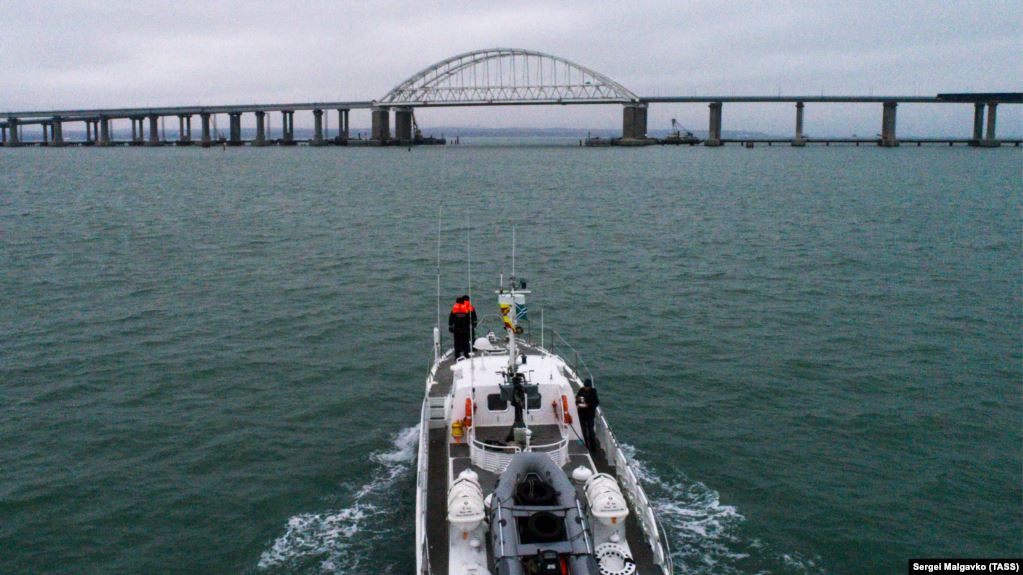Three Ukrainian Navy vessels left the Port of Odessa on November 23rd, and arrived to the entrance of the Kerch Strait two days later. They were on their way to the Ukrainian port of Mariupol in the Sea of Azov. Russian FSB operated Coast Guard vessels violently prevented them to enter the Sea of Azov by shooting and ramming into one of them on 25th of November. Ukrainian vessels were seized by the Russian Coast guard and wounded Ukrainian sailors were arrested.
The incident could have escalated when the Ukrainian Army sent two of their heavy artillery ships from the port of Mariupol to meet the seized vessels. Russian Army reacted by sending attack helicopters and two Su-25 aircrafts to meet the Ukrainian ships. The situation escalated, but the Ukrainian President Petro Poroshenko announced that he will propose to the Ukrainian Parliament – Verkhovna Rada, to adopt the decision on proclamation of Martial Law in Ukraine.
Russian foreign ministry spokeswoman, Maria Zakharova, called the Ukrainian government “highway bandits” that use “bandit methods” in their intention to escalate the conflict in Ukraine.
The Russian foreign minister, Sergey Lavrov, was the first one to link the incident to the Trump-Putin planned meeting in Buenos Aires.
International community reacted by condemning the Russian actions. European Union and the UK parliament reminded that Russia is illegally occupying the Ukrainian territory and that all the incidents related to the situation in Ukraine is solely Russia’s fault and responsibility. Members of the U.S. Congress called for the additional sanctions and pressure on Russia, and caused the cancelation of the planned meeting between the Russian and American presidents that was about to take place in the Argentinian capitol during the G20 summit.
Russian Media Accusing Ukraine of Provocation
Most of the Russian newspapers and TV channels immediately started the campaign accusing Ukrainian President of the planned provocation which, according to them, had two goals – to create additional pressure on Russian Federation, and to enhance Poroshenko’s chances of winning Ukrainian Presidential Elections that should take place in March 2019.
Ruska stampa
The “Izvestiya” claimed that FSB has “undeniable proofs” that this was a planned act of provocation and that Russia has all the rights to seize the vessels and to arrest the sailors.
The official government “Rossiskaya gazeta” says that Poroshenko does everything to “create a conflict in the Sea of Azov”.
The “Kommersant” is writing that Ukraine is pushing Russia to respond to the violation of the Russian Federation law. The newspaper is afraid that this may create an international scandal and may lead to additional sanctions against Russia. They have published several articles on the subject how this crisis affects the Russian economy, blaming the incident for the fall in the value of Russian ruble.
“Komsomolskaya pravda” makes fun of the Ukrainian military equipment and emphasizes the “Russian military superiority”.
“Echo Moksvi” is believed to be allowed to publish the critical opinion as a token opposition media. Their independence is questioned since they are owned and financed by the Russian state-owned energy giant “Gazprom”. Nevertheless, they published an interesting blog by Andrey Illarionov, Russian economist, who is asking a very interesting question, “even though we know Russia occupied Crimea, when did we occupy the Kerch Strait?” pointing to the fact that strait is regarded as a territory of both Russia and Ukraine according to the 2003. Bilateral agreement on the Sea of Azov.
Another Russian opposition media Meduza, based in Latvia, founded by the former journalists of the port lenta.ru when the latter was closed and taken over by the Kremlin, published a report with the map showing that the Ukrainian boats never even violated the Russian occupied Crimean territorial waters, that are Ukrainian according to the international law.
Illarionov, also a senior fellow at the Cato Institute, in his Echo Moskvi blog, writes that the Ukrainian vessels never entered waters beyond the 12 miles line off the Crimean coast, and that they even waited in line for 8 hours to go through the Kerch Strait. Then, out of sudden, Russian forces stormed the vessels.

